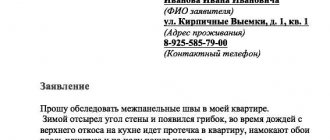01/26/2016 Interaction of the HOA with the management authority
Housing legislation provides that one of the parties to the management agreement is the management organization, but the other party can be both the owners and the HOA or housing cooperative. That is, if an HOA is created in a house, this HOA has a certain “freedom of maneuver” - it can either manage the house independently, or enter into a service agreement with any organization, or enter into a management agreement with a management organization, transferring management functions to it. That is, even if the owners refuse to manage the house with a management organization and choose the method of managing the homeowners’ association, there is no guarantee that the created HOA will not enter into a management agreement with the management organization, and the house will not be managed by the management organization, despite the existence of the HOA. Let's take a closer look at the issue of interaction between the HOA and the MA.
In accordance with Part 2 of Article 161 of the Housing Code of the Russian Federation (LC RF), owners not only have the right, but are also obliged to choose one of the proposed methods of managing an apartment building (MAD): management organization, HOA (or housing cooperative, other consumer cooperative), direct management (if the building has no more than 30 apartments). Each of these management methods must ensure: favorable and safe living conditions for citizens, proper maintenance of common property in an apartment building, resolving issues regarding the use of said property, as well as the provision of utilities to citizens living in such a building. The Government of the Russian Federation establishes standards and rules for the management of apartment buildings (Part 1 of Article 161 of the Housing Code of the Russian Federation). Thus, the purpose of managing a house, regardless of the method of management, comes down to the provision of services and the use of common property.
Management includes:
- Provision of public services;
- Providing services and performing work on maintenance and repair of common property of the house;
- Use of common property (in essence, its management in terms of provision for use or rent to third parties on the basis of a decision of the general meeting of owners, in accordance with Part 3 - 3.1 of Article 44 of the Housing Code of the Russian Federation).
The implementation of all these functions involves collecting funds from the owners of premises and spending them for the specified purposes.
Currently, Part 2 of Article 161 of the Housing Code of the Russian Federation directly prohibits simultaneously choosing two control methods in one apartment building, however, Part 2 of Article 162 of the Housing Code of the Russian Federation has established a “loophole”, using which you can, having formally chosen one control method, in fact implement it simultaneously two ways to control the house.
In accordance with Part 2 of Art. 162 of the Housing Code of the Russian Federation “Under an agreement for the management of an apartment building, one party (the management organization) on the instructions of the other party (the owners of the premises in the apartment building, the management bodies of the homeowners’ association, the management bodies of a housing cooperative or the management bodies of another specialized consumer cooperative, the person specified in paragraph 6 Part 2 of Article 153 of this Code, or in the case provided for by Part 14 of Article 161 of this Code, the developer) within an agreed period for a fee undertakes to perform work and (or) provide services for the management of an apartment building, provide services and perform work for proper maintenance and repair of common property in such a house, provide utilities to the owners of premises in such a house and persons using the premises in this house, and carry out other activities aimed at achieving the goals of managing an apartment building.”
That is, a management agreement can be concluded not only between the MA and the owner, but also between the MA and the management bodies of the HOA. Consequently, if a homeowners association has been created in a house and this homeowners association has entered into a management agreement with the management company, two management methods are actually implemented in the house - management by the homeowners association and management by the management company.
This norm has been discussed several times, but, despite the frequent numerous changes in housing legislation, this particular norm regarding the possibility of either the owners, or the HOA, or the housing complex acting as the second party to the management agreement, has never changed since the adoption of the Housing Code.
It can be assumed that this norm is precisely a loophole that is used to quickly change from one management method to another without holding a meeting of owners and “choosing” a management method.
It should be noted that the management agreement for apartment buildings concluded between the HOA and the MA should not be confused with the maintenance agreement for apartment buildings concluded between the same HOA and the MA. Let's consider these two cases:
1. Management agreement between the HOA and the management company:
- The HOA completely transfers management functions to the management company, because transfers the responsibility (functions) for routine maintenance and repair of the common property of the house, provision of utilities, management of common property. Thus, relations arise between the owners and the management company, although formally the owner is not a party to the agreement, but this agreement determines the position of the owner, his rights and obligations. The owner submits requirements for the quality of services to the MA;
- The HOA does not collect funds from owners for these management purposes;
- The HOA does not spend the funds collected from the owners, the spending is carried out by the MA;
- The governing bodies of the HOA are essentially inactive, because there is no need for their actions, because all functions of managing the house have been transferred, and the management authority independently makes decisions on the procedure for managing the house and spending money; The board and the chairman of the HOA formally exist, and, in fact, only perform the functions of monitoring the actions of the management company, and have the right to terminate the management agreement. Payment for the work of the board and chairman is possible based on the decision of the general meeting of HOA members, but it is not clear who will pay this remuneration, because the chairman of the HOA and members of the HOA board are not employees of the management company. The condition for allocating funds from the maintenance clause for the payment of remuneration to the chairman of the HOA and the board must be separately discussed in the management agreement, including providing for the mechanism and taxation;
- The validity period of such an agreement is not determined by law (part 5 of Article 161 of the RF Housing Code does not regulate such a case), i.e. may be concluded for any period.
- In accordance with paragraph 4 of Art. 148 of the Housing Code of the Russian Federation, the board of the HOA has the right to conclude and terminate such an agreement, i.e. a limited small circle of owners will decide the fate of the entire house and transfer management of the house to the management authority (a decision of the meeting of owners or members of the HOA is not required). The agreement is signed by the chairman of the HOA on behalf of the HOA, and the agreement applies to all owners and fully affects the rights and obligations of such owners.
- All requirements for the quality of provision of utility services, the minimum list of services for maintaining a house, requirements for managing a house, requirements for disclosing information about the management of a house, penalties for non-compliance with any requirements of housing legislation in terms of proper maintenance and management of a house are presented to the management company, the HOA are not is responsible for the quality of services and work, for the condition of the house, but is not responsible for them.
- Due to the fact that all functions of managing the house have been transferred to the management company, the HOA no longer has the need and obligation to approve an annual estimate of income and expenses of the house, as well as a report on the use of funds, on the implementation of the estimate, because the HOA does not manage, does not collect funds, and, therefore, cannot account for their expenditure.
- The amount of fees for routine maintenance (including expenses for managing the house, repairing common property, etc.) is established by the management agreement; this amount is the same for all owners, regardless of membership in the HOA. The question arises: can this fee be greater than the amount approved by the general meeting of HOA members before the conclusion of such an agreement by the HOA board? This situation is not regulated by law, but on the other hand, the decision of the general meeting of HOA members has greater legal force than the decision of the board determining the terms of such an agreement with the management company.
This is important to know: a modular building is movable or immovable property
2. Agreement for the provision of services for the maintenance and current repair of apartment buildings between the management company and the homeowners' association.
- The HOA does not transfer the functions of managing the house; it transfers to the management authority only some of the responsibilities for the maintenance and/or repair of the apartment building, at its discretion, i.e. The MA is hired as a contractor;
- Utilities, house management, routine maintenance, maintenance and repair of common property are provided by the HOA. Relationships between owners are built with the HOA; the owner places demands on the quality of services on the HOA.
- The MA does not manage the house, which means it does not collect funds for management, does not spend them at its own discretion, the MA receives remuneration under a service agreement (in accordance with Chapter 39 of the Civil Code of the Russian Federation). The cost of the contract (services of the management company) and the terms of such an agreement (conclusion, termination, changes, liability, warranty obligations) are determined by the management company and the homeowners association by mutual agreement.
- The agreement is concluded by the HOA based on the decision of the board and only in accordance with the estimate of income and expenses for the year, i.e. in fact, the MA is hired to perform any items according to the estimate (electrician services, emergency maintenance, cleaning of common property and local area, provision of accounting services, etc.);
- To provide any services for the maintenance of apartment buildings and the repair of common property of the management company, you do not need to have a license, because The MA does not manage the house.
- All requirements for the quality of provision of utility services, a minimum list of services for maintaining a house, requirements for managing a house, requirements for disclosing information about the management of a house, penalties for non-compliance with any requirements of housing legislation in terms of proper maintenance and management of a house are imposed on the HOA. If the management company is at fault for the HOA's liability to the control authorities, the homeowners association recovers damages from the management company as a contractor under the contract.
- Contributions for the maintenance and ongoing maintenance of the house, current repairs are approved by a decision of the general meeting of HOA members in accordance with the estimate of income and expenses of the HOA for the year. These fees are the same for all owners, regardless of HOA membership. To spend these contributions in accordance with the estimate, the HOA hires the MA.
Thus, we see that the most effective interaction between the management company and the HOA is the conclusion of an agreement for the provision of services (Chapter 39 of the Civil Code of the Russian Federation) and/or performance of work (Chapter 37 of the Civil Code of the Russian Federation), under which the HOA does not lose the right to manage an apartment building and does not become into fiction, but acts as a customer of services from the MA and becomes its partner. To ensure that your board does not abuse its position and does not enter into a management agreement with the management even on legal grounds, it is necessary in the HOA charter to include the right to enter into management agreements within the powers of the general meeting of HOA members, depriving the board of such a right, otherwise the purpose of creating an HOA is to manage the owners of their home on its own – completely loses its meaning.
Key functions of the management company
- Goals and objectives of the management company
- Functions of the management company
- Main activities of the management company
| Goals of the management company | Functions of the management company |
| 1. Proper maintenance of common property in an apartment building |
|
| 2. Favorable and safe living conditions for citizens |
|
| 3. High-quality housing and utility services in the amount corresponding to the stated needs |
|
| 4. Formation of the cost of housing and communal services for premises owners and the search for ways to reduce it |
|
Does the owner of the premises need an agreement with the HOA for the provision of utilities and maintenance?
Any apartment building needs careful maintenance . It’s great when this maintenance is carried out not by each property owner individually, but by an entire organized body whose goal is to keep the house and common areas in proper condition for as long as possible.
Sometimes this body acts as a management company, sometimes as a homeowners association. Of course, all of the above organizations carry out the necessary work around the house not on their own initiative, but at the request of an agreement that was previously drawn up between them and the residents.
Dear readers! Our articles talk about typical ways to resolve legal issues, but each case is unique.
It is this fact that regulates all the activities of such organizations, as well as the scope of their actions.
In this article, we will study in detail the issues that relate to the drafting of an agreement between the owners of housing in an apartment building and the HOA bodies, and also delve into the study of various nuances and controversial issues on this topic.
You can find out about the pros and cons of an HOA, as well as what objects of common property and local area are on its balance sheet on our website.
Purpose of the agreement between the HOA and the management company
The main purpose of the management company’s agreement with the HOA (homeowners’ association) is to delegate to this organization part of its functions for managing the common real estate of the owners of apartments in the building belonging to this association.
REFERENCE! The management of a housing association has the right to enter into agreements for the purpose of organizing the provision of communal resources (water, electricity, gas), as well as maintenance of common property (Part 1, Clause 1, Article 137 of the Housing Code of the Russian Federation).
An agreement on the management of common property by a third-party company is advisable in cases where members of the HOA:
- do not have sufficient competence to resolve issues of home repair and maintenance;
- do not have the necessary free time;
- have significant debts to utility supply companies.
When concluding a service transaction, the management board must act on behalf of the property owners and in their interests (Part 8 of Article 138 of the Housing Code of the Russian Federation).
More information about what responsibilities the HOA has in relation to the owners, as well as what rights it has, is described in another article.
Concept
Is it obligatory to enter into an agreement?
As we have already found out, any apartment building needs proper care.
Carrying out repair work on time. Timely repair of broken things, maintaining the territory in good condition, actions aimed at increasing the comfort of residents. The implementation of these tasks falls on the shoulders of specially created organizations , the most popular of which in our country are management companies and partnerships.
Of course, services are provided on the basis of incentives and rewards, which is regulated by the relevant legal act. It is this document that regulates all issues that can be raised between the parties and which are of utmost importance.
Since this article is about a homeowners’ association, it is advisable to initially talk about what this organizational and legal form is.
The partnership is represented as a legal entity that has official registration. In addition, this organization promotes itself as a non-profit and for the most part consists of owners of premises in an apartment building.
The partnership may also include residents of neighboring buildings. All these persons together can manage not only the apartment building, but also the general territory on which the buildings are based.
The answer to the question of whether it is necessary to enter into an agreement is quite simple if you are savvy in terms of housing law. And if not, then you can get confused .
On the one hand, the HOA is the owners themselves, why enter into an agreement with them. On the other hand, not all organizations act in the interests of the entire house, and often act in their own interests, therefore, the document will best regulate the rights and obligations of the parties regarding the maintenance of the house.
You can learn about the rights and obligations of the board and founders to residents from our article.
Read on our website about the procedure for creating an HOA, in particular about its organization in an apartment building.
With the owner of the premises
Residents of an apartment building who have recently arrived or who do not wish to become members of the partnership can separately enter into an agreement for technical and utility services for apartments with the HOA.
Unlike a typical agreement with all apartment residents, the owner, who has entered into a separate agreement on the same grounds and rules, can only pay the cost of utilities and technical services. He has the right not to pay all additional fees for the needs of the house, and no one has the right to demand this from him.
If for some personal reasons the owner of a residential premises does not declare membership in the HOA and does not sign a service agreement with him, then in any case the partnership has no right to refuse to provide him with utility services.
If the partnership has incurred expenses for the repair of common household facilities or equipment, but such a tenant refuses to pay his share, then the chairman can apply to a judicial authority to recover funds forcibly.
The main points of the agreement between the HOA and the individual homeowner:
- Date and place of signing of contractual obligations.
- Personal and passport data of the parties to contractual obligations.
- Company name and HOA registration certificate number.
- A complete description of the residential premises, the number of persons living in it (by name).
- List of services provided and the cost of each separately.
- How will the accounting of consumed resources be carried out - according to established standards or metering devices.
- Features of consumption control.
- List of all obligations and rights of the parties to the transaction, conditions for termination of the contract.
- Duration of the obligations assumed.
An example text can be found here.
But there may be other premises in the house, how to correctly draw up an agreement with the owner of non-residential premises?
Such contractual relations between the HOA and the owners of non-residential premises have a number of features:
- a number of non-residential premises are difficult to separate into separate real estate objects;
- in practice, the owners have in their possession part of the basement, free rooms on the first floors of the building.
But concluding separate agreements with them for maintenance and technical support is also the responsibility of the chairman of the HOA.
A typical contract includes the same basic clauses as for a sole owner of an apartment, but it must include the following clauses:
- A list of all general communications passing through non-residential premises.
- List of services provided and their cost.
- Method and procedure of payment.
- Ordering repair and other maintenance work.
- The method of access to communications located in private non-residential property is determined.
And steel points important for contractual relations.
Legislative regulations
In accordance with Article 135 of the Housing Code, a partnership is created for the purpose of managing a multi-apartment building.
This is important to know: The procedure for managing an apartment building
In addition, the Housing Code regulates in its articles other aspects related to the management of a house and interaction with its inhabitants.
Thus, Article 137 of the Housing Code provides for the possibility of a partnership to enter into acts in the form of agreements for the maintenance and repair of an apartment building with its direct participants.
In addition, in paragraph 1 of Article 138 of the Housing Code, the legislator obliges the partnership to conclude these acts-agreements with the owners in writing and strictly follow their clauses.
The issue of payment for activities is also under the jurisdiction of housing law. Code norm 155 obliges owners to regularly make payments that go towards paying the costs of the partnership’s activities for improving and maintaining the house in proper condition.
Read about the responsibilities of a manager in our article. Find out also how to register an organization in the Housing Information System.
Charter of the HOA (homeowners' association)
This document contains twenty-one sections, which makes it quite large-scale. But this is not surprising, since the activities of a partnership of this type require detailed regulation for competent and efficient organization of functioning.
The document will be valid if it is correctly drawn up and completed. The correct entry of the name of the partnership is of great importance. There is a special place for this in the section called “General Provisions”.
We recommend reading: Debt Collection from a Minor Debtor
Document form
In what form is it compiled?
If this question is also relevant for you, we advise you to devote time to studying this item.
A written agreement, that is, drawn up by hand, was very popular a couple of years ago. But now it has lost its relevance for a number of reasons:
- The written text is often difficult to understand.
- Written text may be lost.
- If errors are made, it may be invalidated.
There is no way to save it on electronic media.
From these disadvantages follow the advantages of a document compiled using a computer.
If you still don’t know which method to give preference to, then it’s better to make a choice in favor of printed text rather than handwritten.
You can find out how to complain about the HOA or leave it on our website.
Main points
What should I contribute? Any contract consists of a number of clauses, each of which reflects the essence of the legal relationship that is beginning.
There are certain aspects in the agreement between the partnership and the homeowners that must be mandatory . Let's get acquainted with them:
- Sides . It is imperative to describe which parties take part in this act and by whom exactly they are represented. The more specific, the better.
- The subject is the legal relationship between the partnership and the owners regarding the maintenance of an apartment building. In this paragraph it is necessary to describe what actions are included in the subject of the agreement.
- Rights and obligations . After the item is announced, it is necessary to describe that the owners have the right to count on it, but only if they pay regularly. It is also necessary to describe the rights and obligations of the members of the partnership.
- Responsibility is also an equally important point. Sometimes it happens that one of the parties does not fulfill one or another point, thereby violating the rights of the other party.
Termination is possible by mutual agreement of the parties, as well as due to failure of one of the parties to fulfill the most important conditions.
One way or another, in your case, items can be added and changed.
- If one of the participants has non-standard, special terms of interaction, then these should also be indicated first of all so that over time information about this clause of the agreement is not lost.
You can learn how to make a statement to the HOA about leaks, flooding and repair requirements from our article.
Management Company staffing table
The staffing table of the management company is approved by the chairman of the company's board of directors. The staffing table indicates the names of positions, the number of staff units, the tariff rate, and the regional coefficient. When developing job descriptions, it is important to correctly define the job functions of employees. The main mistake is that job descriptions, as a rule, stipulate certain processes and actions of employees, leaving the results of their activities without attention. This leads to a dispersion of the employee’s responsibility, because the vague wording of the job description (for example, “controls,” “responds,” “coordinates”) does not oblige him to anything specific.
The above disadvantage can be overcome by identifying specific products and employee performance results. This achieves a focus on the specific contribution of the employee to achieving the overall goal of the company.
For example, some functions of the chief accountant can be defined as “Maintaining complete records of incoming funds” or “Accrual and timely transfer of payments to the state budget.” This consolidates the process, the action of the employee, but nothing is said about what these actions should lead to.
Therefore, it would be better to define the functions of the chief accountant through the following formulations: “Availability of reliable information about received funds”, “Absence of debt of the management company for mandatory payments to the state budget.” Having defined the employee’s functions in this way, it is easier to subsequently evaluate the effectiveness of his work, because The job description will contain specific measurable performance results.
The process of defining functions, starting from top to bottom, is most optimal, because The manager conveys to his subordinates his vision of the results of the team’s activities. The criteria for assessing results for each function and the conditions under which performers can achieve them are also determined and agreed upon with employees.
As a result, functions defined in this way become controllable, and their execution becomes verifiable.
Where to start, where to turn?
If you want your home to be maintained by a homeowners' association, then first of all you need to find out the opinion of the other residents on this issue.
For this purpose, a general meeting of owners is convened, at which it is decided whether the residents trust their home to the HOA. After this, you need to select a company.
If you have a company in mind that services a nearby house , you can offer cooperation to this HOA.
After all the formalities have been completed to perfection, it makes sense to move on to the next step.
Where do they apply and where to go? The agreement between a specific homeowner and the owners' association must be drawn up in the proper form . As a rule, the partnership should have a template, based on which the parties can write an agreement.
If there is no sample, then it is easy to find on the Internet. In order for the document to be issued, you do not need to visit any government agency.
An agreement between the partnership and the homeowner can also be drawn up at the partnership office, the main thing is that the document contains the signatures of the parties.
It is important to remember that this document must be drawn up in two copies . One remains in the hands of the owner, the other remains in the office of the homeowners association.
TSN instead of HOA
- participate in the formation of the corporation’s property in the required amount in the manner, manner and within the time limits provided for by this Code, another law or the corporation’s constituent document;
- not to disclose confidential information about the activities of the corporation;
- participate in making corporate decisions, without which the corporation cannot continue its activities in accordance with the law, if his participation is necessary for making such decisions;
- not to commit actions knowingly aimed at causing harm to the corporation;
- not to commit actions (inaction) that significantly complicate or make it impossible to achieve the goals for which the corporation was created.
What documents are required?
Of course, the agreement must be drawn up on the basis of some documents.
In order for the agreement to be executed in accordance with all the rules, the partnership provides the participants with the charter for review, as well as documents from the tax authority on the registration of the partnership.
In turn, the owner must have in hand a document confirming his identity, that is, a passport, as well as a title document for the apartment, that is, ownership, confirmed by documents.
In addition, it would not be amiss to take a certificate from the BTI about the composition of the registered and absence of debts. Attach technical and cadastral documents to official documents of ownership. Of course, each paper requires its own copy.
Processing times and costs
An agreement is drawn up with the HOA for service immediately on site, provided that the parties have no doubts or questions regarding this matter. Sometimes the preparation may be postponed to another day due to the fact that one of the parties did not provide the required documents.
In order for the document to be executed with the owner, you do not need to contribute any money .
For what period is it concluded? The document can be concluded either for a clearly defined period established by the parties, or for an indefinite period .
Failure Cases
When can they refuse?
Registration refusals are not uncommon.
As a rule, they occur for the following reasons :
- You did not deliver any documents. Very often, this fact becomes the reason for leaving the contract without attention.
- It is also possible that you incorrectly completed the application to create a legal entity.
- They may refuse registration if they believe that your charter does not meet the requirements.
- If it turns out that the decision to cooperate with the HOA was not made by a majority vote of residents, then a refusal will also follow.
- In addition, failure to pay the registration fee for a legal entity is also a serious reason for refusal.
Differences between HOA and housing cooperative
10) submit to the authorized executive authorities of the constituent entities of the Russian Federation, specified in Part 2 of Article 20 of the Housing Code of the Russian Federation, within three months from the date of state registration of changes made to the charter of the partnership, certified by the chairman of the partnership and the secretary of the general meeting of members of the partnership, a copy of the charter of the partnership, an extract from the minutes of the general meeting of members of the partnership on making a decision to amend the charter of the partnership with copies of the texts of the relevant changes certified by the chairman of the partnership and the secretary of the general meeting of members of the partnership.
We recommend reading: How to hire a lawyer if you have no money






